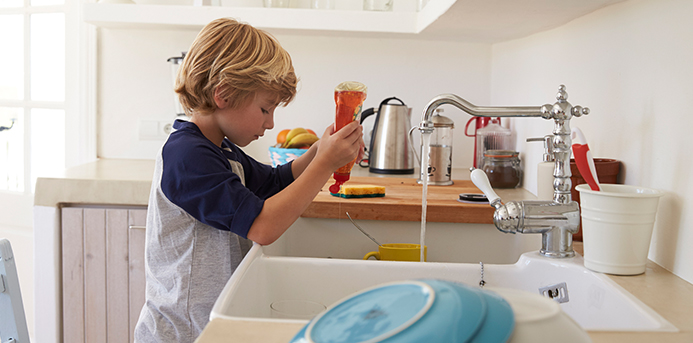“No parent is full of more false hope than one with a new chore chart,” declared Simon Holland’s viral tweet that had parents everywhere laughing and nodding in agreement.
For a household to function, there are chores that need to be done. But trying to get your kids to help you accomplish them can be a losing battle. We asked parenting experts to share their foolproof strategies for getting kids to pitch in — without a fight.
Why It’s Important for Kids to Share the Chore Load
Understanding why it’s important for kids to chip in and take responsibility for some of the household chores is key to strengthening a parent’s resolve. In the moment, it can be easier and faster for a parent to do a chore, but that’s not going to help anyone in the long run.
“Chores are magical!” exclaims Dr. Deborah Gilboa, family physician, author and parenting expert whose popular TEDx talk, “The Expectation Gap,” on chores garnered national media attention. She loves chores because they teach kids important lessons, like gratitude, without long lectures, and they let kids know they are valued, important members of the family.
“By requiring work that makes your home run, [kids] know they’re crucial to the smooth operation of your world, and their confidence will increase as they realize they’re needed and not just wanted,” she says.
Michele Borba, PhD, parenting expert and author of dozens of parenting books, emphasizes that chores can be a way for kids to learn valuable life skills that they will need in college and when they’re living on their own. Gilboa agrees. “Want to go visit your child someday at their own apartment? Teach them how to clean the bathroom so you can use a fairly clean bathroom while you’re there,” she suggests.
Annmarie Chereso, founder of BringIt! Home, which offers programs on mindfulness and conscious leadership skills to parents, kids and teachers, says that having her kids complete chores is essential to her well-being. “I’m one person, and there’s only so much that one person can do,” she says. “It’s important for my kids to support me while I’m supporting them. I help you, you help me — there’s a yin and a yang and it’s how our home functions.”
“When my kids contribute and take responsibility for themselves, I can relax. I’m more available to have fun with them and not as stressed out,” Chereso says.
More proof that chores can be a win-win for parents and kids alike is research by Marty Rossmann, professor emeritus at the University of Minnesota, showing that involving children in household tasks at an early age helps them learn values and empathy as well as responsibility. Rossmann also found that performance of household chores was the best predictor for a young adult’s success.
With that knowledge in hand, Borba says, “What more evidence could you possibly need to parent for this change? Get those kids off the couch and let the chores begin!”
7 Foolproof Tips for Getting Kids in on the Chores
Knowing chores matter is one thing; getting kids to complete them is another. And, according to the experts, it’s all about the approach.
1. Make the completion of chores nonnegotiable and have consequences if they aren’t done.
Gilboa says that parents should calmly make it clear that chores are not up for debate. Borba agrees, noting that consistency is key. “Once kids think that chores really aren’t important, the parent is wishy washy, or ‘Mom will do it for me,’ you lose,” she says.
She acknowledges that kids may grumble when discussing or completing tasks, but that shouldn’t deter parents. “Expect groans and moans. So be it!” she says.
Parents should also make it clear that there are consequences, both for completing chores and for failing to do so. If chores are done, there is time to play a game, watch a movie or go shopping. If chores aren’t done, negative consequences result. “Consequences are not necessarily a punishment, but more a recognition that, if a kid doesn’t hold up their end of the deal, someone else has to pick up the slack and there’s a cost to that,” says Chereso.
2. Get kids on board.
The experts all agree: Kids need to be responsible for their personal items, from clearing their dinner plate and putting away their clothes to doing their own laundry, depending on their age. For tasks that aren’t specific to an individual, consider asking kids if they have a preference. Both kids and adults have chores that they like better than others.
“You need to get their buy in,” says Chereso, who notes that kids appreciate having a say and being heard. Her son isn’t close to the family cat, so he’s more amenable to chores not involving caring for the animal, while her daughter who adores the cat doesn’t mind handling the kitty litter duties.
3. Set expectations based on each individual child’s abilities.
Lists of the types of chores kids should be able to complete by a certain age frequently make the rounds online, and cause some parents to panic. Chereso recommends that parents avoid those. “Those charts are a one-size-fits-all parenting model, and there’s no such thing,” she says.
“Our job as parents is to tune in and pay attention to the child that is in front of you and ask what are they capable of, what do I want to create and how do I do that?” she says, noting that her approach to chores varies significantly for each of her three children.
The Center for Parenting Education advises families to use birthdays or the beginning or end of the school year to revisit chore assignments and determine what responsibilities are most appropriate. Also, have regular family meetings to review assignments and expectations.
4. Don’t overwhelm kids and keep chores manageable.
Kids are easily overwhelmed by tasks that seem daunting. “You will have the most success if you introduce one chore at a time: First show exactly how to do the task, then do it with your child a few times until she can finally do it alone,” says Borba. Breaking larger tasks down into smaller ones — like specifying putting clothes away, vacuuming, and dusting, rather than a blanket “clean your room” — can make them seem more manageable, and let kids know specifically what you expect.
5. Don’t pay kids for chores.
Parents shouldn’t pay kids for chores that parents themselves don’t get paid to do. She also notes that paying kids “makes it too easy for them to quit.”
6. Have a group speed-cleaning session.
Borba’s favorite solution is to give every member of the household, including adults, an assigned area once a week, and distribute cleaning supplies to each person and have a speed-cleaning session. “Set a buzzer for five minutes and then encourage each member to dash to their designated area and clean things ‘spick and span’ before the timer goes off. Kids love to try and ‘beat the clock.’ But best yet it puts the house back in order in minutes and gets every member doing their fair share of picking up,” she explains.
7. Be a good role model and reframe your thinking about chores.
Kids are watching, and they’re internalizing the message that adults send about chores, according to the Center for Parenting Education. If parents approach chores as boring tasks that they avoid and resent, chances are kids will feel the same. However, if parents view chores as tasks essential to a smoothly run household, and tackle them with a sense of fun and humor, kids will pick up on that.
Richard Rende, PhD, a developmental psychologist and researcher from Brown University, worked on a study, commissioned by Whirlpool, about family chores and concluded that parents need to change how they talk about chores — both with each other and to others — and suggested reframing them as one of the ways family members take care of each other.
Expecting kids to do chores benefits both your child and your family at large. Get them started early and, trust us, your kids (and their future roommates and spouses) will thank you.
More from Make It Better:
- 10 Ways to Set Kids Up for a Night of Healthy Sleep
- School Days: Get Out the Door Faster With This Organization Trick
- 13 Tips for Parents of Picky Eaters From Top Chefs and Nutritionists

Shannan Younger is a writer living in the western suburbs of Chicago with her husband and teen daughter. Originally from Ohio, she received her undergraduate and law degrees from the University of Notre Dame. Her essays have been published in several anthologies and her work has been featured on a wide range of websites, from the Erma Bombeck Humor Writers Workshopto the BBC. She also blogs about parenting at Between Us Parents.
Shannan is the Illinois Champion Leader for Shot@Life, a campaign of the United Nations Foundation that supports vaccination efforts in developing countries to ensure life-saving vaccines reach the hardest to reach children. “Vaccines are one of the most effective ways to save the lives of children in developing countries and I’d love nothing more than to see diseases eradicated,” Shannan says. “We are so close to getting rid of polio for good!”

